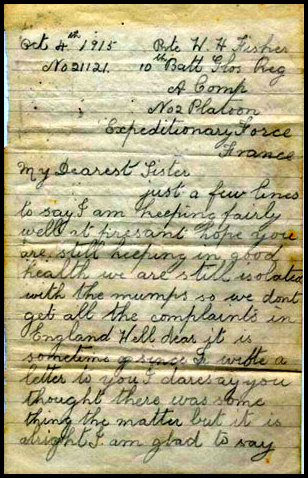|
Private
William Henry Fisher from Cowley near Cheltenham was killed in
action in his first battle in the trenches at Loos, Northern France, on 13
October, 1915 aged 21. Below is his last letter home to his sister,
written a few days before he was killed.

|

Private
William Henry Fisher, aged 21, from
Cowley near Cheltenham.
|

William
Fisher's last letter home to his sister -
written on 4 October 1915. |
|

In
his last letter home William Fishers
continues: "I have seen some Germans,
I had to help guard them down at the
hospital, they are some big fellows."
|

The
last page of William Fisher's last letter
home to his sister in October 1915.
|

The
envelope shows that the letter was posted on 8 October 1915, just five
days before Private Fisher was killed.
|

Private
Fisher's war medals - the 1914-15 Star,
The British War Medal and the Victory
Medal. |
|

William
Fisher's Memorial Death Plaque, commonly
known
as the 'Death Penny'.
|
Private
William Henry Fisher volunteered for the
Glosters in April 1915 but his part in the
Great War was to be short-lived. The 21
year old from Cowley Manor died in the
trenches at Loos in Northern France on
October 13 in his first battle.
He
served with the 10th Battalion of the
Glosters and is remembered on the memorial
at Loos, but he has no known grave.
However,
we can get a glimpse into his life and
what he endured more than 90 years ago on
the Western Front by reading the letters
he sent home to his family in the months
up until his death.
The
collection of letters - written in pencil
on flimsy paper - is now held by the
Soldiers of Gloucestershire Museum in
Gloucester.
Letter
writing to sweethearts and family was an
extremely important part of a soldier's
links to his home during the First World
War and receiving a letter from home was a
big boost to morale. William Fisher's
letters tell of the day-to-day happenings
in the life of a young man far away from
home.
In
June 1915 he wrote: "They are busy
hay making round here, good crops too. We
are going to our trenches Monday for 24
hours so we shall have a night in them, we
are going to blow them up I think so that
we will be all right, we shall make the
dust fly when we starts."
On
19 August, shortly after arriving in
France, he wrote to his sister: "We
are not so very far off the firing line,
so our time will come to have our revenge
on the Germans."
William
didn't take part in the first major battle
of Loos on 25 September because he was in
hospital after catching mumps, but he
wrote that a lot of his battalion had been
killed or wounded. "I daresay you
will see it in the paper," he said,
adding: "There is not many of our
officers left."
Private
Fisher died in the next battle on 13
October. He was one of an estimated 60,000
casualties at Loos out of a total British
force of 250,000.

|